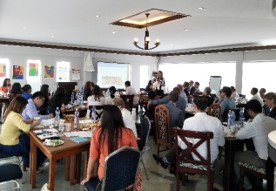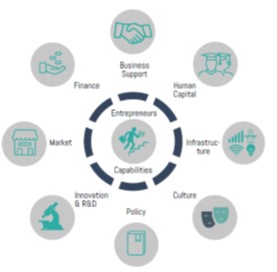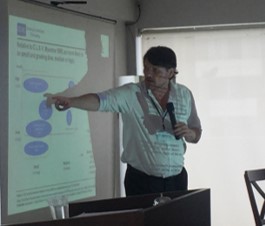Myanmar’s entrepreneurial ecosystem
The Dutch Good Growth Fund (DGGF), in cooperation with the Embassy of the Netherlands in Myanmar, partners with EMC Consulting, the ANDE, Micro Empire and Impact Hub Yangon, gathered local stakeholders in Yangon to discuss new perspectives on Myanmar’s entrepreneurial ecosystem.
On 12 June 2018, local stakeholders from Myanmar’s entrepreneurial ecosystem gathered at Impact Hub Yangon to share their appreciation of the strengths and weaknesses of the ecosystem and elaborate together potential solutions to contribute to a more conducive operating environment for local entrepreneurs and their businesses. Over 35 representatives from financial institutions, business associations, development organisations, the government, business support service providers, educators, corporates and entrepreneurs took part in the event.
EMC Consulting was commissioned by the Dutch Good Growth Fund (DGGF) to undertake a study in the Mekong region, covering Cambodia, Lao PDR, Myanmar and Vietnam (#ClosingTheGap Mekong). The DGGF is an initiative of the Dutch Ministry of Foreign Affairs which seeks to improve underserved small and medium-size enterprises’ (SMEs) access to the financial backing they need to grow. The so called “missing middle” are enterprises who have outgrown micro-finance but do not yet have access to regular financial services. The methodology was piloted in Kenya in 2015 and scaled to a regional level in francophone West Africa in 2017 using the Aspen Network of Development Entrepreneurs’ framework for ecosystem assessment. This framework was modified for #ClosingTheGap Mekong by adding entrepreneurs’ capabilities at its centre.
The research approach draws on analysis of existing SME data sets and an extensive literature review, as well as outcomes of interviews undertaken with entrepreneurs, start-ups, and relevant financial and non-financial institutions in the ecosystem. The workshops bring together those stakeholders to review, validate and challenge research findings to date and engage in an interactive session towards elaborating solutions to address gaps identified in the ecosystem. Conclusions from the workshop are directly captured in the final report and thus inform ecosystem support programs.
Analysis of the World Bank 2016 Enterprise Survey shows that there are around 4,482 establishments employing between 5-99 staff and growing at a rate of over 10% per annum, and collectively these contribute 72,961 full-time jobs and with 1,067 billion kyat (US$ 76 million) turnover.
Myanmar also has a small but active community of tech orientated start-ups and entrepreneurs, supported by a growing number of innovation hubs, education institutions and entrepreneur orientated associations. This has attracted interest from domestic and early stage investors, contributing approximately 58 angel and VC equity investments since 2013.
Across the broader economy business confidence has fallen in 2016, compared to 2015, due to concerns with the pace of reform. However, the long-term view of existing foreign and domestic investors remains very optimistic about growth opportunities in Myanmar.
Following a presentation and Q&A, workshop participants gathered into 5 small groups to work on specially developed case studies outlining different profiles of local entrepreneurs, at a specific development stage of their business, and with identified needs.
Solutions put forward by entrepreneurs and other participants, focussed on accessing appropriate finance and the staffing needs of growing businesses. Among those:
– Linking investors with banks, to reduce overreliance on equity finance.
– Incentives for training programmes, to professionalize and retain middle and upper management in growing firms.
– Banks should develop working capital facilities, to support expansion of successful businesses.
– Support to locate ‘strategic’ investors who can contribute more expertise to business growth in addition to finance.
– Support to identify and procure qualified expertise in business planning, market research and product development and testing.
The recommendations put forward will be refined and elaborated in the final report #ClosingTheGap Myanmar which is expected to be finalised by the end of September 2018 and made available to the public through DGGF’s website.
—-
Related posts include:
Not all SMEs in the Mekong region are alike
Financing challenges for SMEs in the Mekong region




Comments are closed.